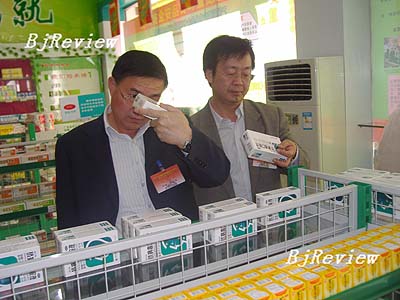|

On November 29, over 100 pharmaceutical companies, food companies, supermarkets and drug stores in 11 cities of southern Guangdong Province were inspected on the safety of their products.
It was the third food and drug safety inspection organized by the Central Govern-ment this year. An inspection team visited Zhejiang Province in September and Shandong in October. Members of the inspection team included officials in quality inspection, quarantine, commerce and environmental protection from different provinces and experts on food and drug safety. The highest-ranking members of the team were Vice Premier Wu Yi and Li Changjiang, Minister of the General Administration of Quality Supervision, Inspection and Quarantine (GAQSIQ).
The three inspections intended to examine the effects of the national campaign on improving product quality and food safety, which was launched in August.
The three inspected provinces all have big economies, with a large number of businesses and an advanced pharmaceutical industry. The total imports and exports of the three provinces together account for over 70 percent of the national total. Thus boosting product quality and food safety in these three provinces will be a profound move toward enhancing the credibility of products made in China both at home and abroad.
The results of these inspections indicated that the national campaign to strengthen product quality and food safety has achieved remarkable success. "All raw material production bases for exported food were inspected and all food for exportation went through inspection and quarantine procedures," said Li.
Li said the campaign initiated in August had also been progressing well in other provinces and regions of China. Over 99.9 percent of companies producing 10 categories of products concerning human health and safety, including electric appliances and toys, have set up product quality dossiers.
An all-out campaign
In the first half of this year, frequent recalls of Chinese products abroad were widely reported in the Chinese and foreign press. The Chinese Government launched a four-month national campaign to boost product quality and food safety on August 23.
Addressing the launching ceremony, Wu said the campaign was about to achieve several goals by the end of this year. All agricultural produce wholesale markets in large and medium-sized cities will be put under a monitoring network; all food production and processing factories must operate with permits on food production; all marketplaces and supermarkets in cities of county-level and above must ask for qualification proof and receipts from their suppliers; all catering companies in cities of county-level and above must purchase their materials only after checking the qualifications of their suppliers; all marketplaces, supermarkets, company cafeterias and catering companies in cities of county-level and above must purchase pork from designated companies; quality dossiers must be set up in all companies whose products might directly affect consumers' health and safety, like electric appliances and toys.
According to Fang Aiqing, Director of the Department of Market Operation Regulation of the Ministry of Commerce, this campaign will focus on eight key areas, covering all public goods in circulation across the country.
Basic goals achieved
"During this national campaign, inspection officials at all levels have faithfully implemented laws and regulated companies by law. Problems solved in these three months would have taken one or two years in the past," said Wu on November 30, after her Guangdong inspection.
Li said, on the quality inspection of agricultural produce, that the top priority is forbidding the use of illegitimate pesticides and feedstuff additives. During the inspection, 499 tons of five kinds of highly poisonous pesticides were confiscated. So far agricultural wholesale markets in 676 large and medium-sized cities have been put under monitoring networks.
Li said the inspections of processed food safety found that 96.3 percent food production and processing factories were operating with permits for food production, while 98.7 percent of small plants had signed commitments to guaranteeing the safety of their products. Local governments have listed quality and safety of products of local companies as an index to evaluate government work.
In the field of safety of food in circulation, 94.5 percent of marketplaces and supermarkets in cities of county-level and above had established the scheme of requiring qualification proof and receipts from their suppliers and 89.4 percent of small grocery stores in communities have started to record their purchases according to government regulations. Over 119,000 small grocery stores without operation permits were closed down.
In the aspect of food safety of catering businesses, over 80 percent of catering companies in cities of county-level and above purchase their raw material only after checking the qualifications of their suppliers; these catering businesses purchased 99 percent of pork from designated companies.
In the aspect of drug safety, all registrations of drugs were required to go through an on-the-spot registration. A new measure of strengthening inspections of pharmaceutical companies was to send quality supervisors to companies producing blood products, vaccinations, medicine for injection and special medicine. A national monitoring network on special medicines has been set up. Companies dealing in drugs are forbidden from going beyond the scope of their business permits. Over 280,000 cases of selling substandard and illegal drugs were investigated during the national campaign on product quality and food safety. The monitoring of illegal drug advertisements had effectively decreased the number of fake and illegal advertisements.
| 